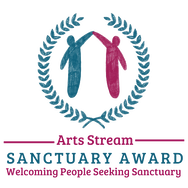|
Mother’s Tongue
Priscilla Okoye I have a mother, and my mother has a tongue. I am my mother’s child, and her tongue is mine, for on her lap and in the cradle of her warm arms, mother’s tongue became mine and became me. I am my mother’s child. The food and clothing, music and dance, values and beliefs, folktales, customs, language, expressions and symbols of our people—that's mother’s tongue. See it, feel it, taste it, listen to it, move to the sound of it, let it live on, for that’s mother’s tongue. It is mine, for I was born with it, in it, and through it. It is mother’s tongue, so I journey with it, for it is who I am. You must have yours, you have a mother, and she’s got a tongue. I may try, but I'll never have your mother’s tongue, for to have it is to be born with it, in it, and through it. So let me have something very close to your mother’s tongue while I still keep mine, for my tongue is mother’s tongue, and mother’s tongue is mine. And yours is yours. |
Ire Nne
Priscilla Okoye translated from English into Iqbo by Nkoli Uzochukwu, Priscilla's mother Enwere m nne, ma nne m nwere ire. Abum nwa nnem, ire ya bụkwa nke m, n’ihi na n'ụkwụ ya, na okpomọkụ aka ya, ire nne ghọrọ nke m, we ghọrọm. Abụ m nwa nnem. Nri na uwe, egwu na ịgba egwu, ụkpụrụ na nkwenkwe, akụkọ ọdịnala, omenala, asụsụ, okwu na akara nke ndị anyị—nke ahụ bụ ire nne. Hụ ya, nwee mmetụta ya, detụ ya ire, gee ya ntị, megharia na ụda ya, hapụ ya ka ọ dịri gaba, maka nke ’a bụ ire nne. Ọ bụ nke m, n’ihi na a mụrụ m ya na ya, n’ime ya, site na ya. Ọ bụ ire nne, ya mere m’ ji ya aga, n'ihi n’ọ ihe m'bụ. Ị ga-enwerịrị nke gị, ị nwere nne, o nwekwara ire. Enwere m ike ịnwa, mana agaghị m enwe ire nne gị, n’ihi na inwe ya bụ na amụrụ gị ya na ya, n’ime ya, site na ya. Ya mere, ka m nweta ihe dị nso na ire nne gị, ma ka m jide nke m, n'ihi na irem bu ire nne, ire nne bu kwa nkem. Ma nke gi bu nke gi. |
Priscilla Okoye is a poet, a psychology student, and an advocate for resilience. With three published poems and unpublished stories, Priscilla weaves emotions into her writings, showcasing a creative spirit eager to explore uncharted narratives. As a psychology student, Priscilla explores the complexities of the human mind, seeking understanding and healing.Beyond academia, Priscilla coordinates a women’s group, supporting and empowering survivors of gender-based violence, who are also refugees, asylum seekers, and migrants. In Priscilla Okoye, poetry, psychology, and advocacy converge, creating a dynamic force for change.Priscilla collaborated with her mother, Nkoli Uzochukwu, on the translation of her poem into Igbo.
Priscilla Okoye bụ onye edemede uri, nwa akwụkwọ mmụta gbasara akparamàgwà mmadụ, na onye na-akwado maka nkwụsi ike. N'ịme uri atọ ya edeputara, na ọtụtụ akụkọ ndị a na-ebipụtabeghị, Priscilla na-etinye mmetụta uche n'ime ihe odide ya, na-egosipụta mmụọ okike nke na-achọsi ike inyocha akụkọ ana kọbeghị. Dịka nwa akwụkwọ mmụta akparamaagwa, Priscilla na-enyocha mgbagwoju anya nke uche mmadụ, na-achọ nghọta na ọgwụgwọ. E wezụga agụmakwụkwọ, Priscilla na-ahazi otu ụmụ nwanyị, na-akwado ma na-enye ndị lanarịrị mkpagbu n'ihi na ha bu ụmụ nwanyi, bụrụkwa ndị gbara ọsọ ndụ, ndị na-achọ ka a nabata ha n'ime obodo, na ndị mbịarambịa. Na Priscilla Okoye, uri, nkà mmụta uche na nkwado na-agbakọta, na-emepụta ike dị ike maka mgbanwe. Priscilla na nne ya bụ Nkoli Uzochukwu jikọrọ aka na ntụgharị uri ya n'asụsụ Igbo.
Priscilla Okoye bụ onye edemede uri, nwa akwụkwọ mmụta gbasara akparamàgwà mmadụ, na onye na-akwado maka nkwụsi ike. N'ịme uri atọ ya edeputara, na ọtụtụ akụkọ ndị a na-ebipụtabeghị, Priscilla na-etinye mmetụta uche n'ime ihe odide ya, na-egosipụta mmụọ okike nke na-achọsi ike inyocha akụkọ ana kọbeghị. Dịka nwa akwụkwọ mmụta akparamaagwa, Priscilla na-enyocha mgbagwoju anya nke uche mmadụ, na-achọ nghọta na ọgwụgwọ. E wezụga agụmakwụkwọ, Priscilla na-ahazi otu ụmụ nwanyị, na-akwado ma na-enye ndị lanarịrị mkpagbu n'ihi na ha bu ụmụ nwanyi, bụrụkwa ndị gbara ọsọ ndụ, ndị na-achọ ka a nabata ha n'ime obodo, na ndị mbịarambịa. Na Priscilla Okoye, uri, nkà mmụta uche na nkwado na-agbakọta, na-emepụta ike dị ike maka mgbanwe. Priscilla na nne ya bụ Nkoli Uzochukwu jikọrọ aka na ntụgharị uri ya n'asụsụ Igbo.


